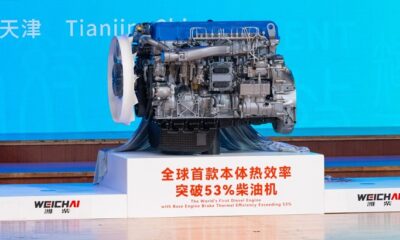Heavy Equipment
Weichai Sets New Efficiency Record for Diesel Engines
Weichai Power’s diesel engine has a thermal efficiency of 53.09%.

Chinese powertrain supplier, Weichai Power, has unveiled a new diesel engine boasting a record-breaking intrinsic thermal efficiency of 53.09%.
The engine, unveiled at the 2024 World Congress on Internal Combustion Engines in Tianjin, China, promises significant fuel savings and reduced carbon emissions.
In 2020, Weichai unveiled a diesel engine with a thermal efficiency of 50.23%. The company, which has been researching high thermal efficiency engines since 2015, announced a further increase to 51.09% in early 2022.
In November 2022, Weichai achieved a thermal efficiency of 52.28%, surpassing its previous feats, which has remained until the new record of 53.09% was set.
Thermal efficiency is a measure of how well a system converts heat into useful work or other forms of energy. It is shown as a percentage and is calculated by dividing the useful output of the system by the total input heat energy.
Weichai Power’s latest success has been recognized by the German testing organization TÜV SÜD and by China Automotive Technology & Research Center.
Both organizations issued Weichai with product testing reports and certificates affirming its new world record in diesel engine thermal efficiency.
RELATED: JCB ‘Zero Carbon’ Hydrogen Engine Debuts at US Expo
Dirk von Wahl, CEO of TÜV SÜD North Asia, said the achievement reflected the company’s strong technical prowess in the internal combustion engine industry.
“This will significantly support China’s carbon peaking and carbon neutrality goals and green development initiatives, while also contributing to the sustainable growth, energy conservation, and emissions reduction of industries,” he said.
Upgrading from a thermal efficiency level of 45-46% to 53% in Chinese diesel engines could boost economy by 14%. This could lead to annual fuel savings of about 31 million tons and a reduction in carbon emissions of about 97 million tons.
For a tractor covering 250,000 km annually, this could save roughly 12,000 litres of diesel per year, resulting in annual savings of about $13,530 for the owner.
RELATED: Caterpillar Unveils Industry’s Biggest Track Loader
The quest of enhancing thermal efficiency in diesel engines has been a struggle for scientists and engineers globally since the inception of the diesel engine in 1897.
This journey has witnessed the evolution of technology, from the simple engines of the past, to the modern devices driving transportation and industry forward.












